May 2025

We create avenues for the industry to gain more insights into emerging trends, industry-specific problems of national importance, and global best practices in logistics & supply chain management. We enable the industry to cut down transaction costs, increase efficiency, and enhance profitability. We are committed to sensitizing the industry about macro-level issues and helping find solutions to them.
India
India and the UK Clinch FTA: FM Expresses Optimism. Blackstone to Invest Rs 5,127 Crore in Maharashtra. Infra Investments Yielding Results: WB President. India Emerges as Key Winner in Global Supply Chain Shift: Nomura. Foxconn to Move Ahead with $1.5M Investment in Tamil Nadu. Paras Defence and Israel's HevenDrones Form JV for Cargo Drones. India's EV Industry Faces Supply Chain Challenges Due to China's Rare Earth Magnet Export Restrictions. International
Amazon Unveils New Warehouse Robots. Kuehne+Nagel Acquires Spanish 3PL TDN. How North American Auto Rail Shippers Are Harnessing AI. UK to Launch £3.5M Testbed for Logistics Tech. Kazakhstan, Hungary Boost Logistics Ties. Mitsubishi and Nissan Strengthen US Ties. Panattoni and Merc Open New ICC in Germany. Uber Freight Launches AI-Powered Logistics Network. How Brands Can Find the Right Logistics Partner Through Tech and Human Touch: Forbes. TIA Report Examines Worsening Freight Fraud Issue. Foreign Investors Step Up Singapore Logistics Bets.
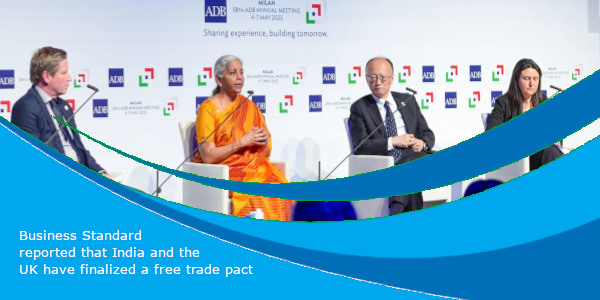
|
| Business Standard reported that India and the UK have finalized a free trade pact. The Finance Minister Smt. Nirmala Sitharaman highlighted that the principle of free trade was of efficiency. She expressed optimism about a similar agreement with the European Union (EU). Speaking at the ‘ADB Governors Seminar: Cross Border Collaboration for Future Resilience’ in Milan, Smt. Sitharaman highlighted the significance of the EU in India’s trade priorities owing to historical ties. She also pointed to the challenges posed by global market fragmentation and stressed the importance of diverse supply chains to mitigate risks, especially in light of recent disruptions stemming from global economic shifts. |
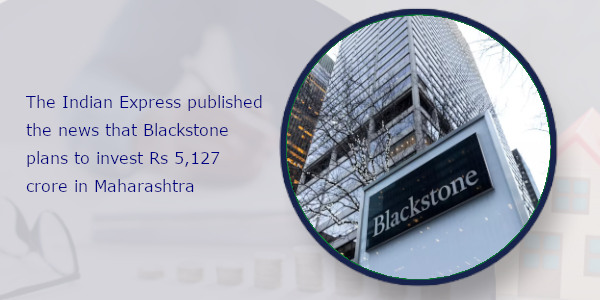
|
| The Indian Express published the news that Blackstone plans to invest Rs 5,127 crore in Maharashtra. The global investment firm Blackstone Group has signed an MoU with the Maharashtra government to develop over 10 logistics and industrial parks, marking a significant boost to the state’s industrial framework. This FDI dealis anticipated to generate about 27,510 direct and indirect jobs. The agreement was formalized by Dr. P. Anbalagan, the state’s principal secretary of Industries, and Mr. R. K. Narayanan, president of Horizon Industrial Parks, in Mumbai, with Chief Minister Shri Devendra Fadnavis and Deputy Chief Minister Shri Eknath Shinde present. According to officials, the parks will cover 794.2 acres in locations such as Nagpur, Bhiwandi, and Panvel. Shri Fadnavis emphasized that this initiative would enhance Maharashtra’s manufacturing and logistics capabilities while ensuring environmentally friendly practices. |

|
| In an interview with CNBC-TV18, Mr. Ajay Banga, World Bank President, underscored the need for substantial efforts to generate jobs in India amidst ongoing progress. He identified the need to lower logistics costs to fuflill the country’s manufacturing ambitions, stating that these costs must be addressed to enhance competitiveness, particularly to realize labor and logistics advantages. Mr. Banga emphasized the importance of innovative solutions and consistent efforts to mitigate these costs. While acknowledging India's vast workforce as a potential asset, he stressed the necessity for upskilling to align with modern manufacturing demands. He commended the Indian government and PM Shri Modi for their proactive reforms and skill development initiatives. He noted that recent investments in infrastructure are beginning to yield positive results. |
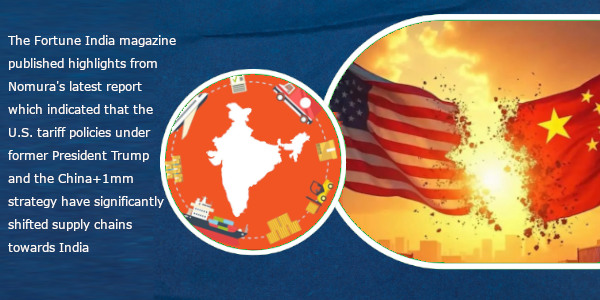
|
| The Fortune India magazine published highlights from Nomura's latest report which indicated that the U.S. tariff policies under former President Trump and the China+1 strategy have significantly shifted supply chains towards India. The firm's analysis have highlighted increased interest from MNCs in low- and mid-tech manufacturing sectors such as smartphones, PCs, and textiles, alongside a growing focus on India's electric vehicle market and solar cell exports. Nomura analysts Ms. Sonal Varma and Mr. Aurodeep Nandi emphasized that while immediate trade diversion is favored due to the lower costs of utilizing existing production facilities, sustained incentives like lower tariffs and a large domestic market could prompt long-term factory relocations to India. The findings underscore India's emerging role in global trade as firms seek to diversify and de-risk their supply chains away from China. |
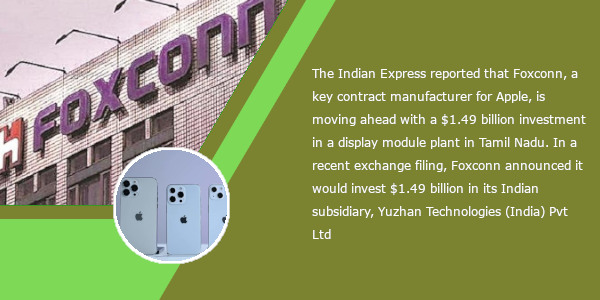
|
| The Indian Express reported that Foxconn, a key contract manufacturer for Apple, is moving ahead with a $1.49 billion investment in a display module plant in Tamil Nadu. In a recent exchange filing, Foxconn announced it would invest $1.49 billion in its Indian subsidiary, Yuzhan Technologies (India) Pvt Ltd. This investment is expectedly linked to a previously approved project worth Rs 13,180 crore in Kancheepuram, situated approximately 80 kilometers from Chennai, said the paper. This investment signifies Foxconn's ongoing dedication to increasing its production capabilities within the region. |
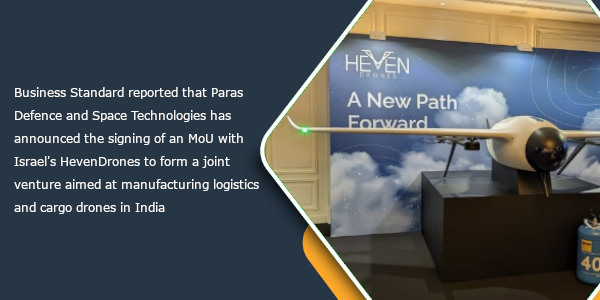
|
| Business Standard reported that Paras Defence and Space Technologies has announced the signing of an MoU with Israel's HevenDrones to form a joint venture aimed at manufacturing logistics and cargo drones in India. This new entity will be responsible for designing, manufacturing, and supplying advanced drone systems specifically for India's defence and homeland security needs while also planning to enter global markets. The collaboration will leverage Paras Defence's engineering and manufacturing expertise alongside HevenDrones' proprietary technologies, marking the introduction of hydrogen-powered drone innovations to India. The statement further said the primary focus of the JV will be on applications such as logistics support in remote and border areas, tactical surveillance, defence supply chains, and missions at high altitudes. |
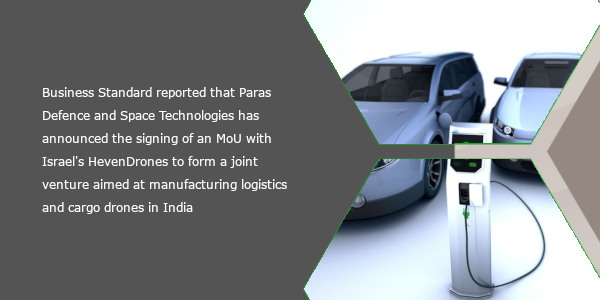
|
| Mint reported that the Indian electric vehicle (EV) sector is facing significant supply chain disruptions due to China's recent restrictions on rare earth magnet exports, which are vital for EV motors. In response to escalating trade tensions with the U.S., China has implemented stricter export regulations, mandating that importers furnish comprehensive end-use certificates and product images. While these measures were initially aimed at U.S. companies, Indian automakers are now experiencing their repercussions, leading to urgent discussions with government functionaries. This situation highlights the necessity for strategic investments in alternative technologies and diversified sourcing to bolster the sector’s resilience and growth, stated the report. |
INTERNATIONAL
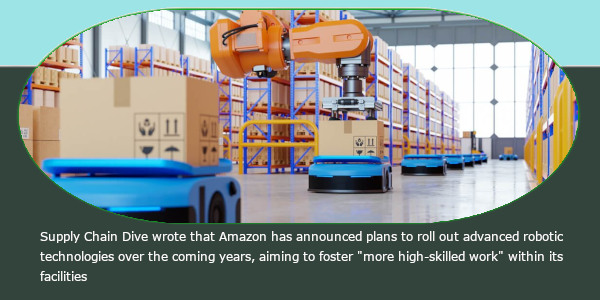
|
| Supply Chain Dive wrote that Amazon has announced plans to roll out advanced robotic technologies over the coming years, aiming to foster "more high-skilled work" within its facilities. Although large-scale deployment is still years away, the capabilities showcased at Amazon's Dortmund, Germany, site illustrate the future integration of machines into its warehouse operations, taking on much of the heavy lifting. Amazon CEO Mr. Andy Jassy noted that the integration of robotics has already led to significant cost savings and enhanced safety. Currently, Amazon utilizes over 750,000 robots, which facilitate the completion of more than 75% of customer orders. The newly unveiled "Vulcan" robot features a dexterous design, allowing it to manipulate inventory with precision while minimizing the need for employee ladders. |
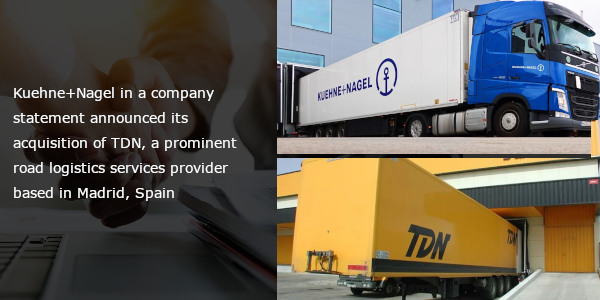
|
| Kuehne+Nagel in a company statement announced its acquisition of TDN, a prominent road logistics services provider based in Madrid, Spain. This move enhances Kuehne+Nagel's capabilities in the European groupage market. TDN has a workforce of over 600 employees and successfully managed more than one million shipments in 2024. The company operates from 45 terminals and utilizes a fleet of more than 700 vehicles within its partner network. TDN serves over 200 daily routes, effectively connecting all regions of Spain, as well as the Balearic Islands, the Canary Islands, and Portugal. This acquisition positions Kuehne+Nagel to strengthen its logistical offerings and improve service delivery across these vital markets, the statement said. |
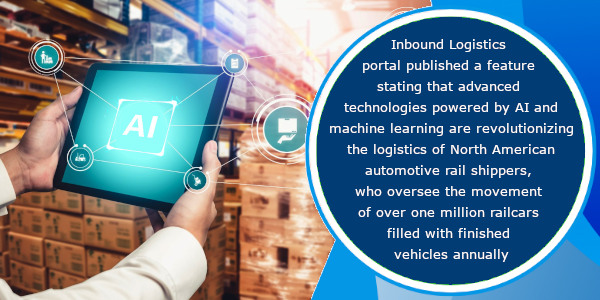
|
| Inbound Logistics portal published a feature stating that advanced technologies powered by AI and machine learning are revolutionizing the logistics of North American automotive rail shippers, who oversee the movement of over one million railcars filled with finished vehicles annually. Alongside this, they manage a similar volume of empty inbound multilevel auto rack railcars and more than 400,000 parts shipments. Despite rail's efficiency and sustainability, shippers encounter challenges like fragmented data and limited real-time shipment visibility, leading to delayed deliveries and increased costs. A key focus for OEMs is enhancing the flow of empty auto racks to facilitate vehicle distribution. By leveraging AI and machine learning on the vast amounts of data generated by approximately 1.6 million daily railcars, manufacturers can improve supply chain performance and reduce costs without increasing management burdens, ultimately enhancing logistics operations. |
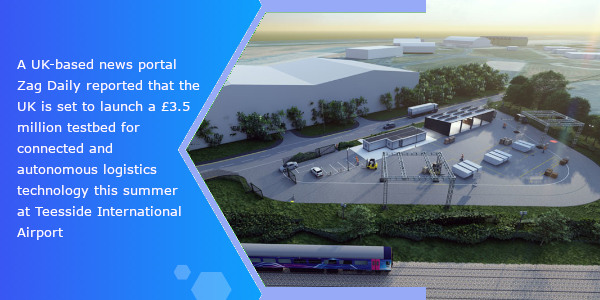
|
| A UK-based news portal Zag Daily reported that the UK is set to launch a £3.5 million testbed for connected and autonomous logistics technology this summer at Teesside International Airport. This initiative, known as the Teesside Digital Trade Testbed, aims to enhance global trade by assisting logistics companies in developing their connected and autonomous mobility (CAM) solutions. Marking the eighth addition to CAM Testbed UK, this facility comprises various independent organizations working to solidify the UK's standing in the CAM market. Developed collaboratively by Teesside University, the Tees Valley Combined Authority, the International Centre for Digital Trade and Innovation, and Teesside Freeport, the Testbed will provide companies with a practical environment to trial technologies like AI, IoT, and machine learning. It seeks to accelerate market readiness, minimize risks, and enhance operational efficiencies, ultimately benefiting businesses through more efficient import and export processes, improved data exchange, and greater supply chain transparency. |
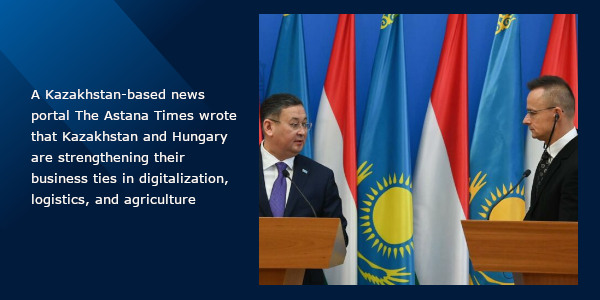
|
| A Kazakhstan-based news portal The Astana Times wrote that Kazakhstan and Hungary are strengthening their business ties in digitalization, logistics, and agriculture. Kazakh Deputy Prime Minister and Foreign Minister Mr. Murat Nurtleu met with executives from Hungary’s prominent companies, including UBM Group CEO Mr. Péter Horváth and BDPST Group Chairman Mr. István Tiborcz, in Budapest. The discussions aimed to enhance investment cooperation and develop joint projects across various sectors, including transport logistics and sustainable technologies. Mr. Nurtleu emphasized Kazakhstan’s commitment to international partnerships, offering robust support at every stage of collaboration. A key focus was on an agro-industrial investment project with the UBM Group, which involves constructing production facilities in the Almaty, Kostanai, and Karagandy Regions. The project is expected to draw an initial investment of approximately $64 million, featuring the establishment of a laboratory, a training center, and essential logistics infrastructure. |
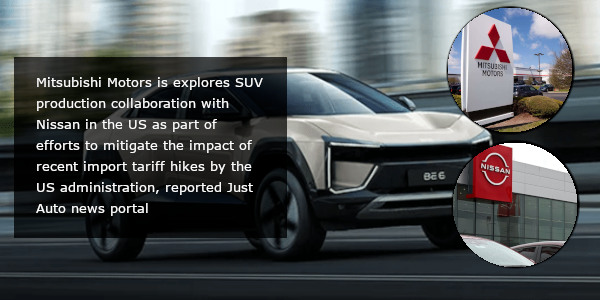
|
| Mitsubishi Motors is explores SUV production collaboration with Nissan in the US as part of efforts to mitigate the impact of recent import tariff hikes by the US administration, reported Just Auto news portal. Currently, Mitsubishi relies on imports since it lacks manufacturing facilities in North America. Mitsubishi Motor’s president Mr. Takao Kato emphasized the necessity of local production for US sales. The company has also announced plans to sell a rebadged version of the next-generation Nissan Leaf electric vehicle in the US, beginning in the second half of 2026, and to rebadge the Nissan Rogue SUV this year. The Mitsubishi-Nissan partnership aims to potentially invest in a Nissan plant in the US for a new SUV model. Additionally, both companies are collaborating on a range of Kei cars in Japan and exchanging vehicle models in Southeast Asia, per the report. |
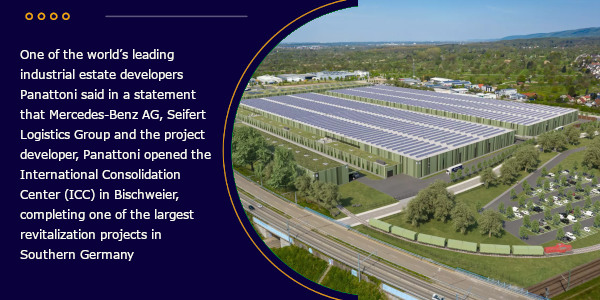
|
| One of the world’s leading industrial estate developers Panattoni said in a statement that Mercedes-Benz AG, Seifert Logistics Group and the project developer, Panattoni opened the International Consolidation Center (ICC) in Bischweier, completing one of the largest revitalization projects in Southern Germany. This logistics facility will serve as a pivotal consolidation point for the global supply network of Mercedes-Benz per the statement. With a usable area of 130,000 m², the ICC is designed for bundling, pre-assembling, and preparing components for production facilities, aiming to enhance supply chain efficiency at both regional and international levels. The center will be operated by Mercedes-Benz in partnership with Seifert Logistics Group. |
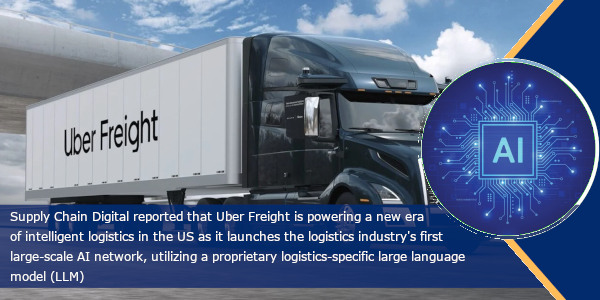
|
| Supply Chain Digital reported that Uber Freight is powering a new era of intelligent logistics in the US as it launches the logistics industry's first large-scale AI network, utilizing a proprietary logistics-specific large language model (LLM). This transformation aims to place AI at the core of decision-making, enhancing execution speed and operational performance for shippers of all sizes. The company plans to evolve its transportation management system (TMS) into a real-time logistics command center by 2025, integrating Insight AI and over 30 AI agents to automate tasks throughout the shipment lifecycle. With more than US$1.6 billion in freight processed and valuable data from nearly US$20 billion in freight under management, Uber Freight’s LLM provides actionable recommendations grounded in real-world complexities. Colgate-Palmolive, a flagship partner in Uber Freight's Design Partners Programme, has leveraged Insights AI, leading to significant enhancements in logistics intelligence and operational decision-making over the past year, the report said. |
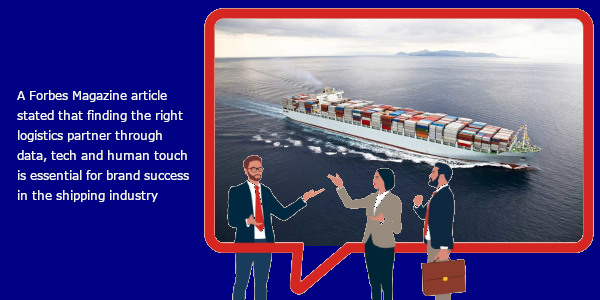
|
| A Forbes Magazine article stated that finding the right logistics partner through data, tech and human touch is essential for brand success in the shipping industry. Data metrics such as cost per parcel, delivery time, and on-time delivery rates are crucial for assessing logistics partnerships; however, raw data alone cannot guarantee effective collaboration. Successful logistics partners leverage advanced technology and human expertise to transform data into strategic actions. They employ tools like machine learning to identify patterns but rely on human judgment to contextualize these insights within a brand’s unique needs. Trust between a brand and its logistics provider hinges on transparent communication and real-time data sharing, not just timely deliveries. Leading logistics firms utilize automated systems for real-time tracking and proactive problem-solving, addressing challenges like inventory issues and market shifts before they escalate. Ultimately, the most effective partners commit to fostering long-term success through a combination of technical capabilities and a deep understanding of their clients’ business goals. |
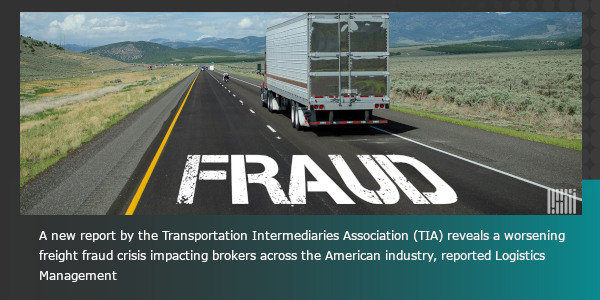
|
| A new report by the Transportation Intermediaries Association (TIA) reveals a worsening freight fraud crisis impacting brokers across the American industry, reported Logistics Management. Titled "State of Fraud in the Industry," the report highlights staggering losses and increasingly sophisticated scams, with TIA noting a lack of support from federal law enforcement. Key findings indicate that 22% of respondents faced fraud-related losses exceeding $22,000 in the past six months, while 10% invested over $200,000 in fraud prevention. Truckload freight emerged as the most susceptible sector, with 97% of brokers identifying it as the primary target for fraud. Additionally, 34% cited unlawful brokerage as the most prevalent scam, disrupting operations and inflating costs. The report found that 83% of brokers have encountered multiple fraud types recently, with Texas, California, and South Florida identified as hotspots for fraudulent activity. |
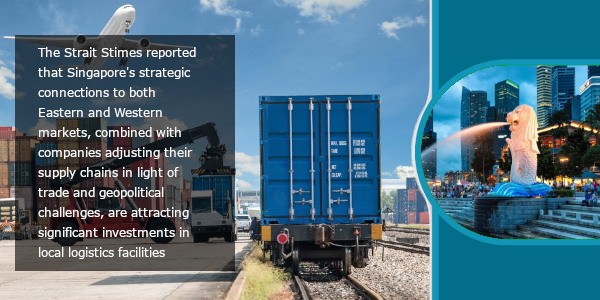
|
| The Strait Stimes reported that Singapore's strategic connections to both Eastern and Western markets, combined with companies adjusting their supply chains in light of trade and geopolitical challenges, are attracting significant investments in local logistics facilities. According to Mr. Dave Goh, vice-president of the Economic Development Board (EDB), the city-state’s exceptional sea and air cargo connectivity, along with a dynamic logistics ecosystem, positions it as a prime location for global manufacturers and logistics providers. Mr. Glen Hilton, the Asia-Pacific chief executive of DP World, highlighted the design of their new warehouse in Singapore, emphasizing its flexibility to meet the changing demands of the trade landscape. Singapore plays a pivotal role in DP World’s regional supply chain network, which encompasses 17 ports and terminals and 62 logistics offices across the Asia-Pacific, following the company's relocation of its regional headquarters from Sydney and Hong Kong to Singapore in 2021. |

|
| Frieght Waves reported that DHL is seeking to transform life science and health care logistics through AI. At a recent Media Day held at one of its four Innovation Centers, DHL showcased how artificial intelligence is reshaping supply chains, especially in the critical life science and health care sectors. The Germany-based global logistics leader announced a substantial $2.2 billion investment over the next five years to enhance its logistics capabilities and operations in these industries, emphasizing the importance of reliability and precision in health care logistics. This investment aligns with DHL's commitment to leveraging its global network to meet the specific needs of pharmaceutical supply chains. Among the 40 trends highlighted in DHL’s Logistics Trend Radar, AI applications were noted as particularly impactful in addressing essential aspects of life sciences logistics, aiming to improve patient outcomes while boosting operational efficiency across the sector. |
We will connect again next month, with a comprehensive dossier of news, trends and events from the industry.
| Courtesy: Newsletter content developed by Mr. Aanand Pandey | ||